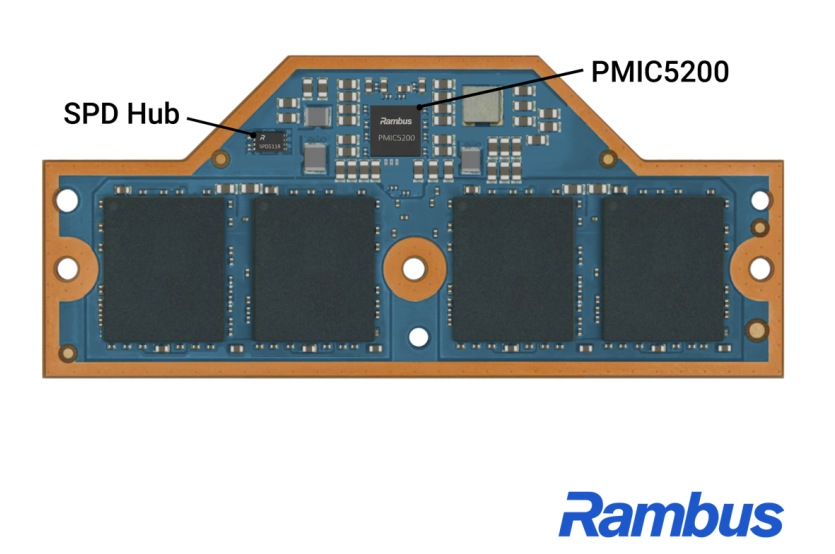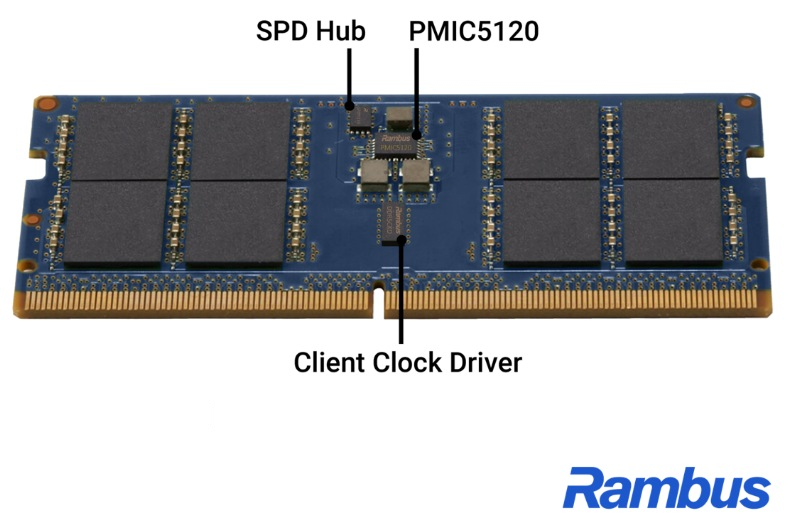Rambus Introduces Industry Leading Client Chipset for Next Generation AI PC Memory Modules
2025-05-16 09:52:22 1244
News Summary:
-Introduced industry-leading LPDDR5 CAMM2 PMIC and DDR5 second generation client PMIC with client clock driver and SPD hub for high-performance laptops, desktops and workstations
-Supports module performance and capacity use cases in a wide range of LPCAMM2, CUDIMM and CSODIMM form factors
-Expanded memory chipset product line to cover all server and PC memory module types under the JEDEC standard

Figure 1. LPCAMM2 Memory Module with Rambus PMIC and SPD Hub Chip

Figure 2. DDR5 CSODIMM Memory Module with Rambus PMIC, CKD and SPD Hub Chips
BEIJING, China, May 15, 2025 -- Rambus Inc. (NASDAQ: RMBS), an industry-leading supplier of chips and semiconductor IP to make data transfers faster and more secure, today announced a complete client chipset of next-generation Artificial Intelligence (AI) Personal Computer (PC) memory modules. (NASDAQ: RMBS) today announced a complete client chipset for next-generation artificial intelligence (AI) personal computer (PC) memory modules, including two new power management ICs (PMICs) for client computing, which are key to efficient power delivery and deliver breakthrough performance for advanced computing applications. The two new industry-leading Rambus PMICs are the PMIC5200 for LPDDR5 CAMM2 (LPCAMM2) memory modules and the PMIC5120 for DDR5 CSODIMMs and CUDIMMs.
Together with the Client Clock Driver (CKD) and Serial Prompt Detect (SPD) hub, the PMICs make up a complete solution for AI notebooks. These two PMICs, together with the Client Clock Driver (CKD) and Serial Detect (SPD) hubs, form a complete chipset solution for AI notebook, desktop and workstation memory modules. In addition, with the introduction of these two new PMICs, Rambus now offers a complete memory interface chipset for all JEDEC-compliant DDR5 and LPDDR5 memory modules for servers and clients.
The rapid proliferation of AI client systems is driving new demands on memory subsystems, with a critical need for memory modules with higher bandwidth and optimized power efficiency," said Rami Sethi, senior vice president and general manager of Memory Interface Chips at Rambus. We are further building on the leadership we have established with our DDR5 server PMIC family with two client PMICs that, together with our client clock drivers and SPD hubs, form a complete DDR5 and LPDDR5 client memory module chipset. Our memory interface chipsets for LPCAMM2 and DDR5 CUDIMMs and CSODIMMs help customers flexibly respond to the diverse needs of next-generation AI PC platforms in terms of package form factor, capacity and bandwidth."
Micron's pioneering of LPCAMM2 technology is driving increased computing performance in AI PCs and reshaping the industry with unprecedented modularity and flexibility,“ said Ross Dermott, vice president of mobile product line management for Micron's Mobile and Client Business Unit, ”Rambus' newest PMIC solution is a key component of our next-generation LPCAMM2 modules, enabling us to push the boundaries of memory performance and continue to solidify our industry leadership in all generations of LPCAMM2 technology."
Dimitrios Ziakas, vice president of memory and I/O technology at Intel, said, "AI PCs with Intel processors are ushering in a new era of productivity, creativity and entertainment experiences. The latest Intel® Core™ Ultra processor family features cutting-edge AI enhancements for greater efficiency and performance. From ultra-thin laptops to powerful workstations, Rambus memory interface chips support PCs of all sizes and dimensions used by business and personal users to help them unlock the full potential of AI's power."
The rapid growth of AI is reshaping the PC market, and demand for memory bandwidth and capacity will continue to accelerate," said Brandon Hoff, executive analyst at IDC. High-performance LPDDR5 and DDR5 memory modules powered by advanced memory interface chipsets will be key to unlocking the vast potential of AI."
Data rates are increasing to meet the demands of advanced workloads such as AI, making signal integrity (SI) and power integrity (PI) management increasingly important. With more than 30 years of experience in high-performance memory, Rambus is known for its signal integrity (SI)/power integrity (PI) expertise. This expertise helps enable DDR5 and LPDDR5 memory interface chips that provide superior signal integrity and power efficiency at higher performance for server and client DIMMs.
To provide the highest performance and reliability, Rambus has introduced a complete memory interface chipset for all JEDEC standard DDR5 and LPDDR5 memory modules, including:
-LPCAMM2 chipset: PMIC5200, SPD hubs
-DDR5 CSODIMM and CUDIMM chipsets: Client Clock Driver (CKD), PMIC5120, SPD hubs
-DDR5 RDIMM 4800 - 8000 chipsets: Registered Clock Driver (RCD), PMIC, SPD hub, temperature sensing ICs
-DDR5 MRDIMM 12800 chipset: Multiplexed Register Clock Driver (MRCD), Multiplexed Data Buffer (MDB), PMIC, SPD Hub, Temperature Sensing ICs




